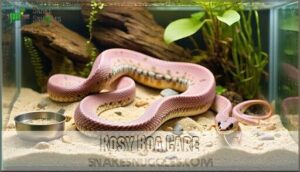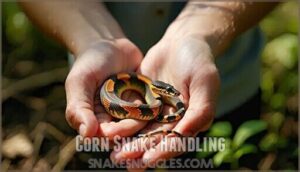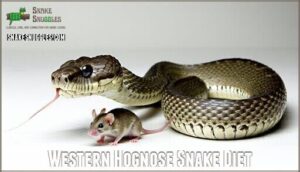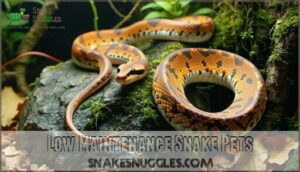This site is supported by our readers. We may earn a commission, at no cost to you, if you purchase through links.
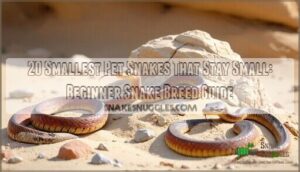 Looking for the 20 smallest pet snakes that stay small? You’re in luck.
Looking for the 20 smallest pet snakes that stay small? You’re in luck.
Rosy boas (Lichanura trivirgata) max out at 3 feet, while Western hognose snakes (Heterodon nasicus) rarely exceed 18 inches. Kenyan sand boas (Eryx colubrinus) stay compact at 15-20 inches, perfect for smaller enclosures.
Ringneck snakes (Diadophis punctatus) are tiny at 10-15 inches but need specialized care. Don’t overlook corn snakes (Pantherophis guttatus) – though they can reach 4 feet, dwarf morphs stay much smaller.
Ball pythons (Python regius) aren’t the tiniest but remain manageable at 3-5 feet. Each species has unique quirks that’ll surprise you.
Table Of Contents
- Key Takeaways
- Smallest Pet Snake Breeds
- Beginner Friendly Snakes
- Low Maintenance Snake Pets
- Easy to Care for Snakes
- Best Starter Snake Species
- Frequently Asked Questions (FAQs)
- What is the easiest small snake to take care of?
- What snake should I get if I am a beginner?
- What is the smallest snake you can get?
- What pet snake stays the smallest?
- What breed of snake is the smallest?
- What is the cutest snake to own?
- What is the ideal snake enclosure temperature?
- How often should small snakes be fed?
- Are small snakes prone to health issues?
- Can pet snakes bond with their owners?
- Conclusion
Key Takeaways
- You’ll find manageable sizes perfect for apartments – Most small snake species, like the Western hognose (18 inches), Kenyan sand boas (15-20 inches), and rosy boas (3 feet max), won’t outgrow typical living spaces or require massive enclosures.
- You can start with forgiving, docile species – Corn snakes, rosy boas, and Western hognose snakes rarely bite and tolerate minor care mistakes, making them ideal for learning proper handling techniques and husbandry basics.
- You’ll need simple but specific care requirements – These small snakes thrive with basic setups, including 20-gallon tanks, temperature gradients of 75-90°F, appropriate substrates, and feeding schedules of every 7-14 days with frozen-thawed prey.
- You shouldn’t assume smaller means easier – Despite their compact size, these snakes still require dedicated care, proper environmental conditions, and species-specific needs, like humidity levels and substrate depths for burrowing species.
Smallest Pet Snake Breeds
You’ll discover that compact snake species make excellent pets for beginners, with many staying under 3 feet their entire lives.
These smaller breeds require less space, eat smaller prey, and often display calmer temperaments than their larger cousins, making them a great choice for those new to snake ownership with excellent pets.
Rosy Boa Care
How can you properly care for one of the smallest boa species? Lichanura trivirgata thrives with specific requirements that make rosy boa handling straightforward for beginner snake breeds.
Essential rosy boa care includes:
- Enclosure size: 20-gallon long tanks minimum for adults
- Temperature gradient: 85-90°F basking, 70-75°F cool side
- Feeding habits: Frozen-thawed mice every 10-14 days
These small pet snakes need low humidity substrates and secure lids. Rosy boas can be found in locality-specific types such as Coastal California and Desert Phase.
Easy snake care involves annual brumation periods that encourage healthy feeding responses in captive small boa species.
Corn Snake Handling
Corn snakes (Pantherophis guttatus) rank among the most docile snake breeds, making safe handling straightforward for beginners.
You’ll want to support their body properly, avoid sudden movements, and recognize stress signals like defensive coiling.
Handle your corn snake 2-3 times weekly once settled, watching for signs like rapid breathing that indicate overstimulation.
These small pet snakes rarely bite when approached calmly, though proper support prevents drops that could injure your pet.
Before acquiring one, make certain you have the ideal temperature gradients to ensure a healthy environment for your corn snake.
Kenyan Sand Boa Habitat
You’ll create the perfect home for your Kenyan sand boa (Eryx colubrinus) by mimicking their East African desert habitat.
Transform your space into an East African oasis—your Kenyan sand boa will thank you for the authentic desert experience.
These small snake species need specific conditions to thrive as tiny snakes for pets.
Essential habitat requirements for your docile snake breeds:
- Substrate Choice: 3-4 inches of sand/soil mix (60% topsoil, 40% play sand) for burrowing needs
- Enclosure Size: 20-gallon long tank minimum for adults of these low maintenance snakes
- Temperature Gradient: 93-95°F basking spot, 78-83°F cool side
- Humidity Levels: 60-80% in substrate, moist hide box
- Hiding Spots: Multiple hides and flat rocks for these small nonvenomous snakes
These snakes are ambush predators, often found in shallow, sandy burrows.
Western Hognose Snake Diet
Your Western Hognose Snake (Heterodon nasicus) thrives on frozen-thawed mice sized appropriately for these small snake species.
Western Hognose snakes thrive when fed properly sized frozen-thawed mice on consistent schedules.
Feed juveniles every 5-7 days, adults every 10-14 days. If your tiny snake refuses meals, try scenting options like chicken broth.
These docile snake breeds rarely need vitamin supplements with proper prey size selection, making them excellent low maintenance snakes among small nonvenomous snakes, and they are considered low maintenance.
Beginner Friendly Snakes
Finding your first snake companion doesn’t have to feel like exploring unfamiliar ground. The best pet snakes for beginners combine gentle temperaments with straightforward care requirements, making them perfect for newcomers to reptile keeping.
Here are three key factors that make certain species ideal starter snakes:
- Predictable temperament – Calm snake breeds like corn snakes and rosy boas rarely show aggression, making safe handling easier to master
- Forgiving care requirements – These snakes for small spaces tolerate minor mistakes in temperature or humidity without serious health issues
- Readily available resources – Popular beginner species have extensive care guides and veterinary support
When you’re learning handling techniques, these small colubrid snakes respond well to gentle, confident movements. Temperament training isn’t necessary since apartment-friendly snakes naturally exhibit docile behaviors.
Remember to research a snake’s needs, including understanding snake anatomy, before bringing it home. Snake enrichment can be as simple as providing hiding spots and occasional supervised exploration time outside their enclosure, helping you avoid common beginner mistakes while building confidence.
Low Maintenance Snake Pets
You’ll find that low-maintenance snake species make excellent pets when you can’t dedicate hours to daily care routines.
These beginner-friendly serpents require minimal handling, simple feeding schedules, and straightforward habitat management that won’t overwhelm first-time snake owners.
Milk Snake Enclosure
A 20-gallon long tank provides adequate Enclosure Size for most milk snake varieties, though secure lids remain essential since these best pet snakes excel at escaping.
You’ll need two Hides Needed on opposite temperature zones, plus Climbing Branches for enrichment.
Apartmentfriendly snakes like milk snakes thrive with aspen Substrate Type, making them popular small snakes perfect for small colubrid snakes enthusiasts seeking snakes for small spaces.
Many owners purchase specialized milk snake supplies for their enclosures.
Garter Snake Feeding
Garter snakes thrive on diverse diets including frozen mice, earthworms, and occasional feeder fish.
You’ll feed juveniles every other day, adults weekly. Prey size should match your snake’s mid-body width.
Scenting food with earthworms helps picky eaters accept frozen options. These apartmentfriendly snakes among popular small snakes need vitamin supplements occasionally for ideal health in captivity, and are considered ideal for certain environments.
Docile Snake Species
You’ll find that most small python species and dwarf snakes for sale showcase remarkable docility, making safe interaction straightforward.
Corn snakes, rosy boas, and western hognose snakes rarely bite when you use proper handling techniques.
These colorful small snakes respond well to temperament training through consistent, gentle contact.
Affordable pet snakes like these unique small snakes have low bite risk due to natural docility factors.
Non-Aggressive Snake Breeds
Beyond docility, you’ll want non-aggressive snake breeds that rarely bite during human-snake interaction.
Corn snakes (Pantherophis guttatus) showcase calm snake behavior, making gentle snake handling effortless for beginners.
Western hognose snakes (Heterodon nasicus) display theatrical defense but maintain docile snake temperament.
These colorful small snakes, along with affordable pet snakes like rosy boas, represent ideal non-biting snakes for new owners seeking peaceful companions.
Easy to Care for Snakes
You’ll find that caring for small snake species becomes remarkably straightforward once you understand their basic environmental needs.
Most compact breeds thrive with simple setups that won’t overwhelm your space or budget, making them perfect companions for both apartment dwellers and first-time reptile keepers, which is a perfect arrangement.
Sand Boa Substrate
Sand Boa substrate choices directly impact your snake’s health and burrowing behavior. You’ll want aspen shavings or cypress mulch – avoid cedar or pine which cause respiratory issues.
Sand mixes work well but monitor for substrate impaction during feeding. Clean substrates monthly or when soiled.
Substrate selection is key for their well-being. Place heating elements underneath one side, maintaining proper humidity levels around 30-40% for ideal Sand Boa burrowing conditions.
Corn Snake Temperature
Your corn snake needs a heating gradient with basking spot temperatures reaching 85-88°F and cool side temperatures around 75-78°F.
Night temperature drops to 70-75°F are perfectly natural.
Install thermostat control for consistent heating and use temperature monitoring devices to track both ends of the enclosure daily, ensuring a proper heating gradient.
Humidity Requirements
You’ll need to maintain proper humidity levels to prevent shedding problems and respiratory infections in your small snake.
Most species thrive between 40-70% humidity, though desert species like rosy boas require lower levels. Monitor with a hydrometer placed mid-enclosure and adjust misting frequency accordingly. Digital hygrometers are essential for accurate monitoring.
- Rosy boas: Keep below 60% humidity to prevent skin issues
- Kenyan sand boas: Maintain 60-80% despite their desert origins
- Western hognose: Prefer 30-50% reflecting their arid habitats
- Corn snakes: Thrive in moderate 40-60% range
Snake Hide Options
Why settle for basic hides when your snake deserves comfort? Hide materials range from natural cork bark to artificial caves, each offering unique benefits.
Size considerations matter—your snake should fit comfortably without feeling exposed.
| Hide Type | Material | Best For |
|---|---|---|
| Cork Bark | Natural wood | Western Hognose, Rosy Boa |
| Plastic Cave | Synthetic resin | Easy cleaning, all species |
| Rock Formation | Stone composite | Kenyan Sand Boa, natural look |
| Wooden Box | Treated lumber | Corn Snake, customizable size |
Multiple hides create security zones throughout the enclosure. Hide placement should include both warm and cool sides for thermoregulation. Cleaning hides regularly prevents bacterial buildup and maintains your pet’s health.
Best Starter Snake Species
You’ll find these compact species perfect for beginners, with most staying under 3 feet and requiring minimal space compared to larger constrictors.
These starter snakes combine manageable size with docile temperaments, making them ideal choices whether you’re setting up your first 20-gallon enclosure or looking for a snake that won’t outgrow your apartment.
Corn Snake Morphs
You’ll discover over 800 corn snake morphs with stunning Pattern Variations and Color Intensity differences.
Morph Genetics create endless possibilities through recessive and dominant genes, making Breeding Projects exciting for enthusiasts.
Popular New Morphs include amelanistic albinos and snow varieties.
Like URL encoding in web development where UTF8 encoding and character encoding guarantee proper URL parameters display, these genetic combinations produce reliable, beautiful results.
Some morphs, like the Okeetee, have a deep orange base.
Rosy Boa Size
Rosy boas (Lichanura trivirgata) reach their adult length of 18-36 inches, making them perfect for compact living spaces.
Their slow growth rate means you won’t outgrow your enclosure size quickly.
Sexual dimorphism isn’t dramatic in length, though females typically reach the upper range while males stay smaller, maintaining a consistent captive size throughout their lives.
Unlike URL encoding parameters that expand during processing, these snakes are notable for their slow growth rate.
Western Hognose Snake Temperament
Western Hognose snakes (Heterodon nasicus) exhibit remarkable hognose docility once they’ve settled into captivity stress-free environments.
You’ll notice their famous defensive behaviors initially—dramatic hood flattening, hissing, and even "playing dead" when threatened.
However, proper handling techniques reveal their gentle nature beneath the theatrical displays.
Individual variation means some adapt faster than others, but most become surprisingly calm pets.
Their temperament resembles a URL encoding issue—what appears complex initially becomes straightforward with understanding.
Affordable Snake Options
Budget-friendly snakes won’t break the bank, with garter snakes starting around $20 and corn snakes from $25-$100.
You’ll find beginner packages that include basic setups for under $350 total.
Choose affordable morphs over rare varieties, and remember that cheap snake food keeps ongoing costs minimal—most species eat just $60 worth annually.
Frequently Asked Questions (FAQs)
What is the easiest small snake to take care of?
The corn snake (Pantherophis guttatus) stands out as your best bet for easy care.
You’ll love their docile nature, simple feeding routine with frozen mice, and forgiving temperature requirements around 75-85°F.
What snake should I get if I am a beginner?
Like choosing your first loyal companion, selecting a beginner snake requires wisdom.
You’ll want Pantherophis guttatus (corn snake) – they’re docile, hardy, and forgiving of minor care mistakes, making them perfect starter serpents.
What is the smallest snake you can get?
The smallest pet snake you can keep is the Kenyan Sand Boa (Eryx colubrinus loveridgei), with males staying around 14-18 inches. You’ll love their docile nature and minimal space requirements.
What pet snake stays the smallest?
Think you’re getting a "pocket dinosaur"? The Kenyan Sand Boa (Eryx colubrinus loveridgei) stays smallest at 18-24 inches, making it perfect for beginners wanting compact serpents without sacrificing personality.
What breed of snake is the smallest?
The Kenyan Sand Boa (Gongylophis colubrinus) holds the crown for smallest pet snake, with adults typically reaching just 18-30 inches. You’ll find these compact desert dwellers incredibly hardy and beginner-friendly.
What is the cutest snake to own?
Western Hognose Snakes (Heterodon nasicus) are often considered the cutest with their upturned "pig nose," dramatic defensive displays, and compact 14-36 inch size, making them perfect beginner pets.
What is the ideal snake enclosure temperature?
Ironically, you’ll need different temperatures for your snake’s survival, not comfort. Most species require a basking spot around 85-90°F and a cool side at 75-80°F for proper thermoregulation.
How often should small snakes be fed?
Small snakes typically need feeding every 7-14 days, with juveniles eating more frequently than adults. You’ll feed appropriately-sized prey like frozen-thawed mice based on your snake’s girth and species requirements.
Are small snakes prone to health issues?
Small pet snakes aren’t particularly prone to health issues if you provide proper care.
However, they can face respiratory infections, mites, scale rot, and feeding problems.
Most issues stem from incorrect humidity, temperature, or poor husbandry rather than genetic predispositions.
Can pet snakes bond with their owners?
Pet snakes don’t bond like mammals do, but they can recognize you, tolerate handling better over time, and show reduced stress responses.
You’re building trust, not emotional attachment—they’ll associate you with safety and food rather than forming genuine bonds.
Conclusion
Ironically, choosing from the 20 smallest pet snakes that stay small often means you’ll discover they’re not necessarily the easiest to manage.
These compact species require just as much dedication as their larger cousins.
Western hognose snakes (Heterodon nasicus) might throw dramatic death performances, while Kenyan sand boas (Eryx colubrinus) need specific substrate depths for burrowing.
Your perfect beginner snake exists among these tiny serpents—you just need to match their unique requirements with your commitment level and experience.
- https://www.ingleside.com/services/other-pets/blog/top-5-beginner-friendly-pet-snakes-according-vets
- https://animals.howstuffworks.com/pets/otherpets/pet-snakes.htm
- https://www.reptilecentre.com/blogs/reptile-blog/top-3-pet-snakes-for-beginners
- https://www.youtube.com/watch?v=yZcZU8RWcAc
- https://www.petmd.com/reptile/slideshows/best-captive-bred-snakes-stay-small

